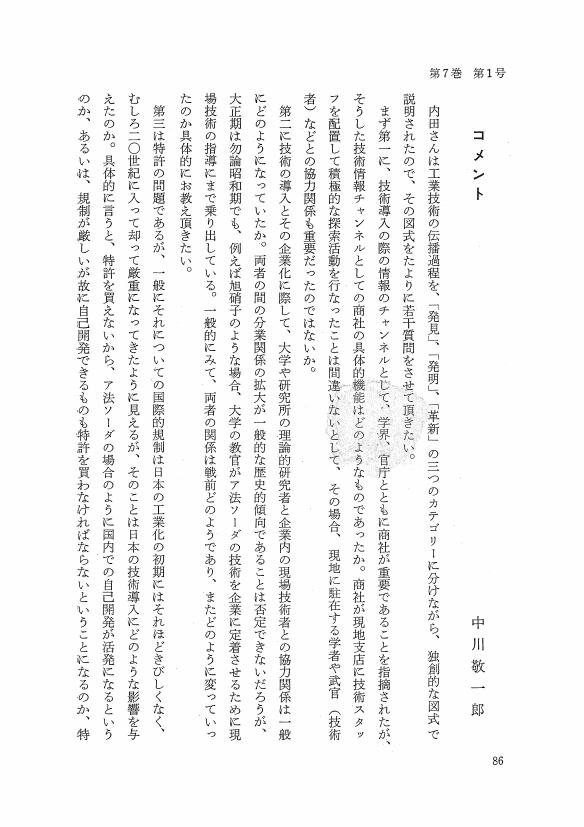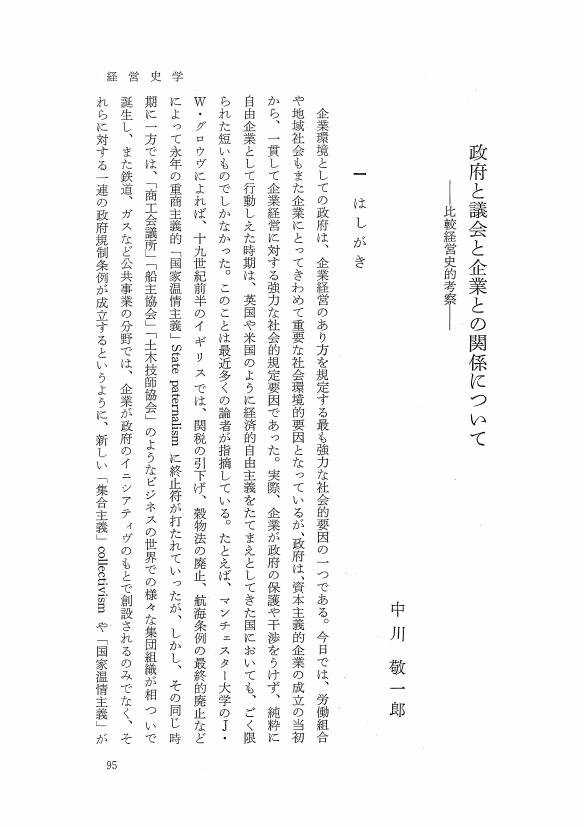1 0 0 0 近代化と工業化 : 小松芳喬教授還暦記念論文集
- 著者
- 増田冨壽 中川敬一郎編
- 出版者
- 一條書店
- 巻号頁・発行日
- 1968
1 0 0 0 OA 問題提起-文化構造と企業者活動
- 著者
- 中川 敬一郎
- 出版者
- 経営史学会
- 雑誌
- 経営史学 (ISSN:03869113)
- 巻号頁・発行日
- vol.10, no.1, pp.1-4, 1975-08-25 (Released:2009-11-06)
1 0 0 0 OA コメント4
- 著者
- 中川 敬一郎
- 出版者
- 経営史学会
- 雑誌
- 経営史学 (ISSN:03869113)
- 巻号頁・発行日
- vol.8, no.1, pp.122-125, 1973-08-25 (Released:2009-10-14)
1 0 0 0 OA コメント4
- 著者
- 中川 敬一郎
- 出版者
- 経営史学会
- 雑誌
- 経営史学 (ISSN:03869113)
- 巻号頁・発行日
- vol.7, no.1, pp.86-87, 1972-05-30 (Released:2009-11-06)
1 0 0 0 OA 政府と議会と企業との関係について 比較経営史的考察
- 著者
- 中川 敬一郎
- 出版者
- 経営史学会
- 雑誌
- 経営史学 (ISSN:03869113)
- 巻号頁・発行日
- vol.6, no.1, pp.95-118, 1971-10-20 (Released:2009-10-14)
- 参考文献数
- 8
1 0 0 0 OA インドの経済発展と企業者活動
- 著者
- 中川 敬一郎
- 出版者
- 経営史学会
- 雑誌
- 経営史学 (ISSN:03869113)
- 巻号頁・発行日
- vol.4, no.1, pp.39-54, 1969-01-26 (Released:2009-11-11)
- 参考文献数
- 16
1 0 0 0 OA コメント4
- 著者
- 中川 敬一郎
- 出版者
- 経営史学会
- 雑誌
- 経営史学 (ISSN:03869113)
- 巻号頁・発行日
- vol.3, no.1, pp.105-107, 1968-03-15 (Released:2009-11-11)
1 0 0 0 OA 日本の工業化過程における「組織化された企業者活動」
- 著者
- 中川 敬一郎
- 出版者
- 経営史学会
- 雑誌
- 経営史学 (ISSN:03869113)
- 巻号頁・発行日
- vol.2, no.3, pp.8-37,ii, 1967-11-15 (Released:2009-11-11)
The gate into modern industrial society is generally narrower for the follower than for the leader countries. Moreover, to catch up with the leader countries, the late-comers must pass this narrow gate more rapidly than did leader countries. Various segments and sectors in a backward economy are inevitably juxtaposed and the narrow gate forces all elements and sectors in the national economy. Therefore, the Meiji entrepreneurs in the course of industrialization tended to think and act rather with a broad and national horizon, considering the problems of various levels, sectors and units of the national economy. In short, the Meiji entrepreneurs were unable to secure their private profit unless those aspects of social interactions-social gains-were deliberated simultaneously.Such an organized aspect of Meiji entrepreneurship was particularly evident in foreign trade. Japan possessed no organization of foreign trade on the eve of industrialization. Therefore, the formation of powerful commercial enterprises had to precede the emergence of modern industrial production, and one of the results of such an evolution of commercial organization was the famous “general merchants” (sogoshosha), a unique feature in the modern industrial society of Japan. They had to perform the functions of bankers, exchange brokers, insurance brokers and sometimes even the function of shipping firms, and as such these multi-functional organizations gradually grew into big business. Through their world-wide network of branch offices, they explored the newest industrial techniques and surveyed market opportunities abroad. They proceeded at times to promote subsidiaries for the purpose of insustrializing the technology they imported and sometimes they purchased independent factories to assure the quantity of goods they were to export. Thus they truly became industrial organizers on a large scale. The “Zaibatsu” organization was the result of such an organized entrepreneurship executed by genral merchants.
1 0 0 0 OA 組織と経営史学 コメント/討論
- 著者
- 中川 敬一郎
- 出版者
- 経営史学会
- 雑誌
- 経営史学 (ISSN:03869113)
- 巻号頁・発行日
- vol.1, no.1, pp.41-50, 1966-06-20 (Released:2009-11-11)






